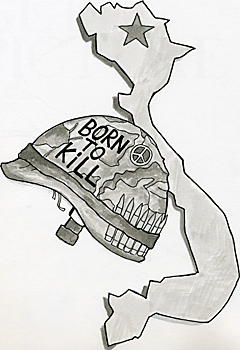 |
|
|
Illustration by Taejun Lim
|
|
|
By Alan Eder
Arizona Daily Wildcat
Wednesday, October 12, 2005
Print this
"We shall pay any price, bear any burden, meet any hardship, support any friend, oppose any foe to assure the survival and the success of liberty."- President John F. Kennedy, 1961 inaugural address
As inspiring as these words are, such rhetoric risks creating obligations that we, not even the U.S., can fulfill. Under this central tenet, the war in Iraq and Vietnam War are similar. Under Kennedy's watch, the first troops were sent to Vietnam in defense of liberty. Likewise, under President Bush's vigilance, troops were sent to Iraq to ultimately make the world safer.
But unfortunately, both wars suffer from similar ambiguities in the nature of the occupations. In Iraq's case, why we are there and who are we fighting are becoming important questions. As has been said before, but merits repetition: Iraq is the new Vietnam.
Iraq is a war being prosecuted for ambiguous reasons much like Vietnam; while we fought against an indefinable communism in Indochina, we currently fight a general, vague war against terrorism in the Persian Gulf.
Just last week, Bush compared the war on terror to the Cold War. Framing in larger context the struggle of ideas between freedom and terrorism, he equated the fight against radical Islam to the battle against communism.
But such rhetoric is only the latest in the shifting justifications for the war in Iraq: It changed from a war against weapons of mass destruction, to a war to make the world safer, to a war to liberate the Iraqi people and bring democracy to the Middle East.
Consequently, while the domino theory captivated Lyndon Johnson into prosecuting Vietnam, Bush now subscribes to a similar version: If democracy grows in Iraq it will spread to other Middle Eastern nations.
But the utility of this theory is now clearly bankrupt in hindsight. For all the effort and power of the United States, South Vietnam eventually fell, but communism did not extend beyond the peninsula. In Iraq, in turn, it is antithetical to think that democracy can be instituted at the point of a gun, much less to see it spread afterward.
As the years pass in Iraq, Sen. John Kerry's "quagmire" analogy remains apt. The purpose of our involvement in Iraq has to be questioned; with a never-ending spate of bombings and suicide attacks, 2005 is rapidly becoming 1966.
Here, political science professor Michael Sullivan sees similarities in the processes of both wars. Each time there is a positive outcome, such as the forming of an independent government or the writing of a constitution, he notes that the "effects seem short-lived, and insurgent attacks are renewed - not unlike Vietnam."
Like Johnson's promises of progress in Vietnam, the current administration touts new development, but in fact the U.S. takes one step forward only to be sent two steps back. Officials publicize the building of infrastructure, but casualty levels mount and the troops are still present.
According to Sullivan, who has taught American foreign policy courses at the UA for more than 35 years, "the bottom line is that we are still there, and at this point with no visible end in sight."
Consequently, public support for the war gradually dissolves just as Iraq slowly disintegrates into civil war. In Vietnam, we asked the purpose of spending billions of dollars on an unproductive war instead of at home. We must beg the same question now.
Recently, Sen. Chuck Hagel (R-Neb.) did just this. Commenting on the many similarities between the Iraq war and the U.S.'s involvement in Vietnam, he told "This Week" on ABC, "We are locked into a bogged down problem not unsimilar or dissimilar to where we were in Vietnam. The longer we stay the more problems we are going to have."
He further added that the U.S. must develop a strategy to leave Iraq, criticizing a Pentagon plan that U.S. forces could remain in Iraq for four more years at levels beyond 100,000.
Although it may be too soon to judge how long the occupation in Iraq will last, until the administration more clearly defines its goals, we are there for an indefinite period, much like the days of Saigon.
Meanwhile, our troops and our nation are paying the greatest price and bearing the greatest burden for the ambiguity in our policy.
Bush claims that we cannot fail in Iraq, but by staying indefinitely, we are creating another Vietnam in the process. He would do well to create an exit strategy if he does not want to share the same historical fate as Johnson.
Alan Eder is a senior majoring in Spanish and political science. He can be reached at letters@wildcat.arizona.edu.
